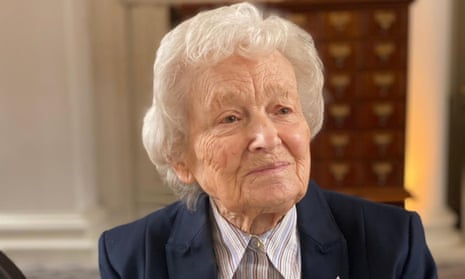In 1943, Branko Petrović, a teacher in Kikinda, Yugoslavia, was arrested for helping the wartime resistance movement, and was executed by the Nazis, leaving a nine-year-old daughter, Ljubica. He could never have foreseen the life that his daughter, later known as Ljubica Erickson, and who has died aged 88, would go on to have. Nonetheless his tender care, especially after her mother, Antonia Wolfe, abandoned them, had a lasting legacy. Her world outlook was informed by her father’s Christianity, Marxism and wise maxims: “We are too poor to buy cheap clothes” was one she often quoted.
As a Slav, Ljubica had already experienced being defined as less human than Germans and Hungarians. She was intrepid, sourcing food for her household and confronting a relative to demand the return of stolen furniture and livestock. After her father’s death she was unofficially adopted by Branko’s lover, Milica Durić, a young widow. They remained devoted to each other for the rest of their lives.
From studying English at Belgrade University Ljubica won a scholarship to the University of Birmingham. In Britain, she met John Erickson. They were married in 1957, settling in the 1960s in Edinburgh, where John became professor of defence studies at the university.
The fact that his wife had been liberated by the Red Army helped John gain unique access to the Soviet military archives to produce his books The Soviet High Command (1962), The Road to Stalingrad (1975) and The Road to Berlin (1983). Ljubica was his first reader, editor, translator and sometime co-author. She was key to the Edinburgh Conversations, the 1980s roundtable discussions between Soviet and Nato military that are credited with helping end the cold war. The Ericksons’ home hosted many senior figures, generals, foreign secretaries, journalists and TV crews.
Meanwhile she also looked after her children, Amanda and Mark, and became a social worker specialising in adoption and fostering. She worked hard to try to make things as good as they could be for her children in sometimes difficult circumstances. Later, she offered unstinting childcare and love to all her grandchildren. Her Yugoslav identity remained important to her. As a cook, she was a Yugoslav Elizabeth David, serving delicious “peasant” food. She was horrified by the war in the 1990s.
Ljubica undertook many community roles, at her church, the Scottish Arts Club, as a children’s guardian ad litem, as a historical tour guide for the Dalyell family’s House of the Binns in Linlithgow and the Georgian House in Edinburgh, and as a trustee of the charity Deaf Action.
John died in 2002. Ljubica is survived by Mark (my partner), and Amanda, and her grandchildren Milica, Jozef and Kathleen.
